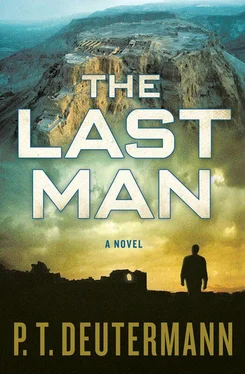He nodded. “It wasn’t the only reason. I did want to get a feel for the place and contemplate the history. The myth, as you call it.”
“Not just me, Mr. Hall. Most professional archaeologists would call that story a myth. Until someone finds real evidence, it will remain a myth.”
“Won’t find it if no one is looking,” he said.
“It’s been two thousand years,” she said. “If someone finds a cave with nine hundred sixty skeletons, then, yes, we will all look a little foolish.”
Right now, I’m the one looking a little foolish, he thought. He looked at his watch and began making as graceful an exit as he could manage. He got out his rented cell phone and texted Ari to bring the car up.
They stood by the doorway as he waited for the car. Kiss the pretty girl good night? He looked into her large, dark eyes and saw the expectation. He kissed her then, lightly, tentatively even, and then again with a little more feeling. She broke it off after a few moments and smiled at him as she opened the door.
“Good night, Mr. Treasure Hunter,” she said.
“Can I see you again?” he asked, surprising himself.
She cocked her head to one side. “You are not yet officially shot down, David Hall. We shall see.”
* * *
As Ari drove him back to his hotel, David wondered if this whole project wasn’t getting a bit out of hand. The incident in the harbor had unsettled him, despite Judith’s all-day attempts to push it away. Would that guy have shot him if the woman hadn’t blundered into the frame? Had one of Israel’s many security organs deduced what he was up to? He’d found the cistern that no one knew about — was that enough? Why make a very dangerous dive into a black hole? Why not simply tell Judith and let the experts do it right?
He became aware of headlights behind them as they went down the winding highway back to Tel Aviv. It looked like the other car had his high beams on.
“We being followed, Ari?” he asked the driver.
“Some asshole with his bright lights on,” Ari grumbled. “I will slow down, make him pass.”
Ari began reducing speed on the four-lane, and after a minute or so the other vehicle swung out and went past. David could see that it was some kind of nondescript van. He half expected a window to come down and bullets to start flying, but the van disappeared around the next bend in the road as Ari resumed highway speed.
Getting a little paranoid here, David thought. He turned around to look out the rear window and saw another set of headlights behind them, about a half mile back. This vehicle was on low beam. Was it a box trap being set up? He’d seen one in a movie, where the car ahead dropped back and the one behind sped up, and then the two of them pushed the target vehicle off the road and over a cliff. He looked sideways. There wasn’t a cliff, but there was a pretty deep ravine. He peered past Ari’s shoulder to see if he could spot the van, but there were no lights ahead as the road straightened out and the lights of the city hove into view ahead.
Get a grip, he thought. I’m gonna do it. I’m going to prove them all wrong about what happened long ago. Adrian might have dumped him after he got himself fired, but she had well and truly infected him with her unswerving belief in her theory. It was his theory now; nothing was going to stop him from validating it, one way or another.
“No traffic now,” Ari called out from the front seat. “Fifteen minutes, tops.”
He missed the turnoff onto the military road just north of the mountain, catching only a glimpse of it as he drove by in the darkness along the Dead Sea road. He slowed, stopped, turned off the headlamps, and then carefully turned around to find the entrance again. It was nearly 10:00 P.M., and he could just see the security lights of the hostel and tourist complex shining down onto the tour bus parking lot three miles down the road. He hoped no one had seen him coming.
The main road veered east toward the Dead Sea shore just north of the fortress mountain, so his headlamps should not have been pointed directly at the tourist center. On the other hand, he had seen no other vehicles out here for an hour. He spotted the entrance again and veered left onto a gravel road that wasn’t much wider than the Land Rover itself. He pulled a hundred yards off the road and shut the engine off, got out, stretched, and then walked to the back of a boulder to take a leak. To his left, two miles distant, the fortress loomed atop its sheer stone cliffs. The pale bones of Herod’s marble palace-villas, perched out on the descending step terraces, shone through the darkness. He shivered in the rapidly cooling desert air as he looked up at it. Ahead the desert track led up toward the western plateau where the main Roman siege camp had been set up. He got back in the Land Rover and started up the track, now using only his parking lights. There would be no moon for several more hours, but the starlight was adequate.
A quarter mile in from the Dead Sea road he passed through the remains of the circumvallation wall, which now was just a two-foot-high pile of weathered stones disappearing in a ragged line into the darkness. The wall, a standard feature of all Roman sieges, was the first thing General Silva had erected after the main siege camp. It had then been an eight-foot-high rock wall thrown up around the entire circumference of the mountain, bolstered by outpost camps whose outlines could still be discerned from the mountaintop, and patrolled by sentries for the entire course of the siege. It had been designed to keep anyone from coming down off the mountain at night to escape the siege.
The track rose steeply now, and he had to drop the Land Rover into a lower gear to make the climb. He heard the equipment shift behind him as the boxy vehicle tilted upward. The army had bulldozed this track up to the western plateau so that the Yadin expedition could get their equipment and tents closer to the fortress. He thought it ironic that the Israelis had sought the same ground General Silva occupied two thousand years ago.
Once he got up onto the plateau he passed by the rubble of the main Roman camp’s wall. He pulled the Land Rover up to four old Israeli Army Conex boxes that stood next to the remains of a mining cable-car tower. The army had erected the cable tramway using two towers back in the early sixties, one at the base of the siege ramp and the other up at the top of the mountain on the western parapet walls. The tramway was no longer operational, but they had not seen fit to dismantle the towers other than to take down the actual cables and the tower top on the ramp. The corrugated steel Conex boxes were the World War II variant of modern-day seagoing containers, some twenty feet long, eight feet wide, and seven feet high. They had been used during World War II to move cargo and then as shelters for small field headquarters or radio communications stations once at the battlefront. The U-shaped cluster of boxes made for a perfect place to nest the Land Rover, which should keep it out of sight of anyone looking down from the mountain and, he hoped, any patrols passing along the western rim of the Wadi Masada. He doused the lights, got out, put on his windbreaker, and then sat down on the steps of one of the Conex boxes to listen and watch for a while.
There was a light breeze blowing up here on the bare plateau. Surrounding the boxes and the tramway tower were small rocky enclosures that had been the foundations of the Roman army storehouses during the siege. The place was eerily beautiful in the starlit darkness. He marveled at the logistics of the siege. The Romans had had to bring everything they needed for subsistence down from the wreck of Jerusalem, including drinking water, because the Dead Sea was nothing more than a mineral stew. Water for the three thousand men of Silva’s army had been carried for two and a half years all the way across the Judaean fastness by women prisoners of war. They used Roman amphorae, the ubiquitous two-handled clay jars that could hold up to three gallons and weighed fifty-seven pounds. Once the women arrived with the jars, they were put to work building the siege ramp. When they became exhausted with the routine of filling baskets with sand and then carrying them up to the base of the mountain, they would be rounded up and marched back to the springs of Ein Gedi to bring more water. Those who could still walk, anyway.
Читать дальше












